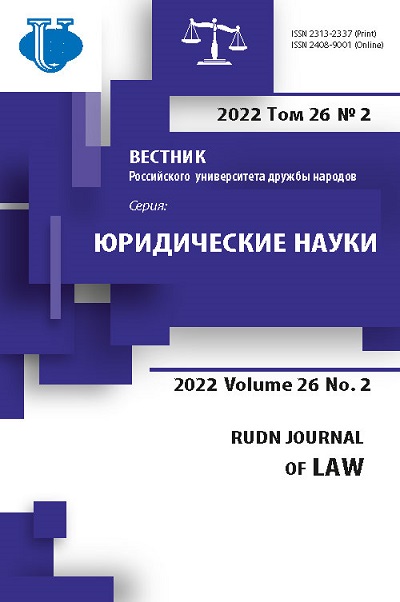On the criminal law measures of regulation of surrogacy in foreign countries
- Authors: Chukreev V.A.1
-
Affiliations:
- Prosecutor’s Office of the Sverdlovsk Region
- Issue: Vol 26, No 2 (2022)
- Pages: 419-432
- Section: CRIMINAL LAW AND CRIMINOLOGY
- URL: https://journals.rudn.ru/law/article/view/31092
- DOI: https://doi.org/10.22363/2313-2337-2022-26-2-419-432
- ID: 31092
Cite item
Full Text
Abstract
The relevance of the article is termined by the fact that the surrogacy industry is currently rapidly developing. This is not only an effective way to help couples who do not have the opportunity to conceive children on their own, but also a big business. The cost of commercial surrogacy is quite high. This correct and useful deed quickly turned into a high-budget illegal event. It involves transnational criminal organizations. In this connection, the attitude towards surrogacy around the world is diverse and ambiguous. There are countries where this act is prohibited under threat of punishment. The aim of the study is to comprehensively study the legal problems of regulating relations associated with surrogacy. The research methodology is based on the analysis of the criminal law regulation of similar relations in foreign countries, implementation of best practices in the legislation of the Russian Federation as well as improvement of regulatory legal acts in matters of assisted reproduction and protection of individuals from illegal exploitation. The author came to the conclusion that it is necessary to adopt uniform standards for all countries that regulate surrogacy, which would take into account the interests of all the parties involved and create a mechanism for crim-inal law counteraction to shadow surrogacy.
About the authors
Vadim A. Chukreev
Prosecutor’s Office of the Sverdlovsk Region
Author for correspondence.
Email: chukreevva@mail.ru
ORCID iD: 0000-0002-1354-5443
Candidate of Legal Sciences (PhD), Deputy Prosecutor of the Sverdlovsk Region
21 Moskovskaya str., Yekaterinburg, 620014, Russia FederationReferences
- Anderson, E. (1993) Values in Ethics and Economics. Cambridge, MA, Harvard University Press.
- Bailey, A. (2011) Reconceiving Surrogacy: Toward a Reproductive Justice Account of Indian Surrogacy. Hypatia A Journal of Feminist Philosophy, 26 (4). рp. 715-741.
- Bakova, D. & Davcheva, D., et al. (2018) Study of the attitude of Bulgarian society towards surrogacy. Biomedical Research. 29 (21), 3835-3841.
- Daunt, F. (1991) Exploitation or empowerment? Debating surrogate motherhood. Saskatchewan Law Review. 55, 415-428.
- Ergas, Y. (2013) Babies Without Borders: Human Rights, Human Dignity, and the Regulation of International Commercial Surrogacy. Emory International Law Review. 27 (1), 117-188.
- Fixmer-Oraiz, N. (2013) Speaking of Solidarity: Surrogacy and the Rhetorics of Reproductive (in) Justice. Frontiers. 34 (3), 126-163.
- Hatzis, A.N. (2003) 'Just the Oven': A Law & Economics Approach to Gestational Surrogacy Contracts. In: Boele-Woelki, K. (ed) Perspectives for the unification and harmonisation of family law in Europe. Antwerp, Intersentia, pp. 412-433. http://dx.doi.org/10.2139/ssrn.381621
- Jaiswal, S. (2012) Commercial Surrogacy in India: An Ethical Assessment of Existing Legal Scenario from the Perspective of Women’s Autonomy and Reproductive Rights. Gender, Technology and Development. 16, 1-28
- Kirby, J. (2014) Transnational gestational surrogacy: does it have to be exploitative? The American Journal of Bioethics. 14 (5), 24-32. https://doi.org/10.1080/15265161.2014.892169
- Kristinsson, S. (2016) Legalizing altruistic surrogacy in response to travel evasiveness? Iceland’s offer. Reproductive Biomedicine & Society Online. 3 (1), 109-119. https://doi.org/10.1016/j.rbms.2016.12.003
- Mohapatra, S. (2012) Achieving Reproductive Justice in the International Surrogacy Market. Annals of Health Law. 21 (1), 191-200.
- Nayana, H.P., et al. (2018) Insight into different aspects of surrogacy practices. Journal of Human Reproductive Science. 11 (3), 212-218. https://doi.org/10.4103/jhrs.JHRS_138_17
- Olavarría, M.E. (2018) Brokers and Donors: Surrogacy Motherhood in Mexico. Revista de Antropología Social. 27 (2), 325-351. https://doi.org/10.5209/RASO.61855
- Saravanan, S. (2013) An Ethnomethodological Approach to Examine Exploitation in the Context of Capacity, Trust and Experience of Commercial Surrogacy in India. Philosophy Ethics and Humanities in Medicine. 8 (10), 1-12. https://doi.org/10.1186/1747-5341-8-10
- Shetty, P. (2012) India’s unregulated surrogacy industry. The Lancet. 380(9854), 1633-1634. https://doi.org/10.1016/S0140-6736(12)61933-3
- Teman, E. (2010) Birthing a Mother: The Surrogate Body and the Pregnant Self. Berkeley, University of California Press.
- Twine, F.W. (2015) Outsourcing the Womb: Race, Class, and Gestational Surrogacy in a Global Market (2nd ed.). Routledge. https://doi.org/10.4324/9781315720128
- Vodo, T. (2016) Altruistic Surrogacy Why to oppose empathetic gestures? European Christian Political Movement. 2, 1-18.
- Voevodin, L.D. (2000) Legal status of a person in Russia. Moscow, MSU, Infra-M-Norma Publ. (in Russian).
- Walker, R. & van Zyl, L. (2017) Towards a Professional Model of Surrogate Motherhood. London, United Kingdom, Palgrave Macmillan.
Supplementary files















